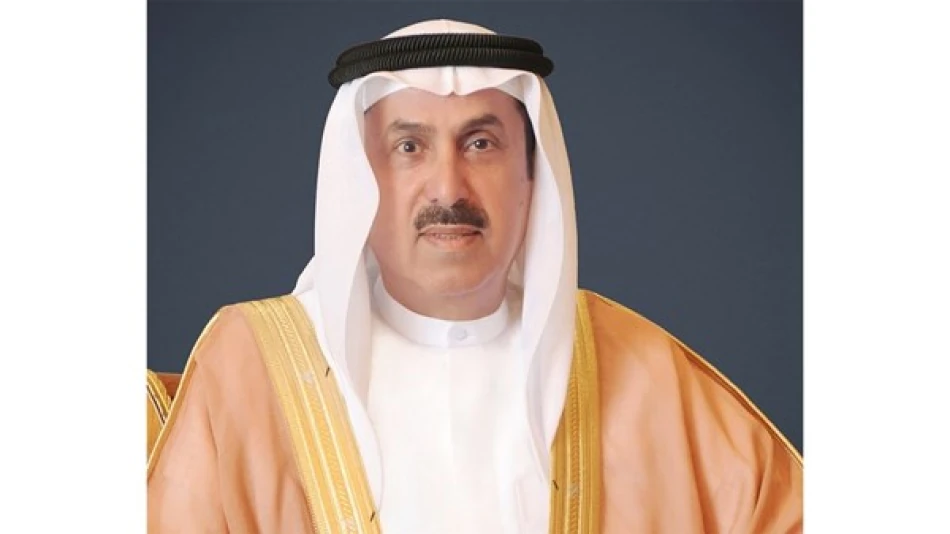
Iconic UAE Era: Visionary Founders' Legacy Honored by Emirati Leader Saqr Ghobash
UAE Marks Union Pledge Day: A Strategic Reminder of Federal Unity in Times of Regional Uncertainty
As the UAE commemorates Union Pledge Day on July 18th, Federal National Council President Saqr Ghobash emphasized the enduring significance of the nation's founding principles, highlighting how the country's federal structure continues to drive its transformation into a global economic powerhouse. The annual observance serves as both a tribute to the founding fathers and a strategic reinforcement of national unity amid evolving regional dynamics.
The Historical Foundation That Built Modern UAE
Union Pledge Day marks the historic moment when the UAE's founding fathers, led by the late Sheikh Zayed bin Sultan Al Nahyan, signed the Union Document and the nation's constitution, officially establishing the United Arab Emirates. This federal compact created one of the Middle East's most successful political experiments—a confederation that has managed to balance tribal traditions with modern governance structures.
The timing of this year's commemoration is particularly significant, as the UAE continues to navigate complex regional challenges while maintaining its position as a stable hub for international business and investment. The federal system established in 1971 has proven remarkably resilient, allowing individual emirates to maintain their distinct identities while pursuing coordinated national objectives.
Economic Implications of Federal Unity
Strategic Diversification Success
The UAE's federal structure has enabled what economists call "competitive federalism"—where different emirates specialize in various sectors while maintaining overall coordination. Dubai's focus on trade and finance, Abu Dhabi's energy and sovereign wealth management, and Sharjah's cultural initiatives exemplify how federal unity has facilitated strategic economic diversification.
This model has attracted significant international attention, particularly from investors seeking stability in volatile regions. The UAE's federal system provides multiple entry points for foreign investment while maintaining consistent national policies on key issues like foreign ownership, taxation, and regulatory frameworks.
Regional Competitive Advantage
Unlike neighboring countries that have struggled with centralized governance challenges, the UAE's federal approach has created what analysts describe as "institutional redundancy"—if one emirate faces difficulties, others can maintain economic momentum. This has proven particularly valuable during oil price volatility and regional political tensions.
Modern Challenges and Federal Adaptation
Ghobash's emphasis on continuing the "blessed federal journey" reflects ongoing efforts to adapt the UAE's governance model to contemporary challenges. The country faces increasing competition from Saudi Arabia's Vision 2030 initiatives and Qatar's World Cup-driven development, requiring continued federal coordination to maintain competitive advantages.
The focus on "investing in the Emirati citizen" mentioned in the commemoration speech signals recognition that the UAE's federal success ultimately depends on human capital development. This approach contrasts with resource-dependent models in other Gulf states and aligns with global trends toward knowledge-based economies.
International Positioning and Federal Diplomacy
The UAE's federal structure has enabled sophisticated diplomatic positioning, allowing different emirates to maintain distinct international relationships while pursuing coordinated foreign policy objectives. This "federal diplomacy" has proven particularly effective in managing relationships with competing global powers and regional actors.
President Sheikh Mohamed bin Zayed's leadership, as highlighted in the commemoration, represents continuity with founding principles while adapting to contemporary geopolitical realities. The UAE's ability to maintain relationships across ideological divides—from hosting Israeli businesses to maintaining Iranian trade connections—demonstrates the practical benefits of its federal approach.
Looking Forward: Federal Unity as Strategic Asset
The Federal National Council's renewed pledge of loyalty, as expressed by Ghobash, reflects recognition that the UAE's federal system remains its primary competitive advantage in an increasingly complex regional environment. As neighboring countries grapple with centralization challenges and succession uncertainties, the UAE's institutionalized federal structure provides stability that international partners value.
For investors and international businesses, Union Pledge Day serves as an annual reminder of the institutional foundations that have made the UAE a reliable partner for long-term strategic planning. The combination of federal stability and emirate-level innovation continues to attract capital flows that might otherwise seek more traditional financial centers.
The emphasis on achieving excellence "in all fields" and becoming "among the world's best countries" reflects ambitious goals that leverage federal coordination while maintaining the competitive dynamics that have driven the UAE's rapid development over five decades.
Most Viewed News

 Layla Al Mansoori
Layla Al Mansoori






